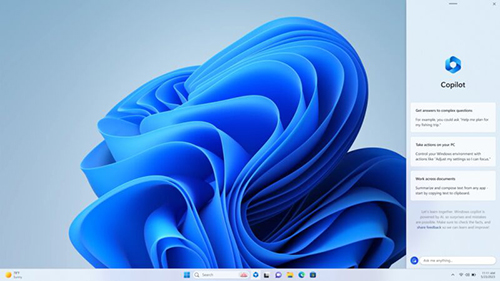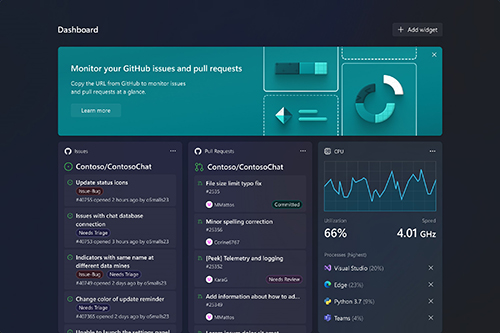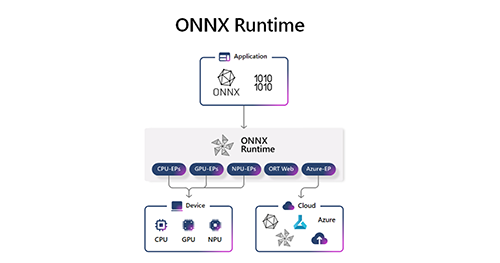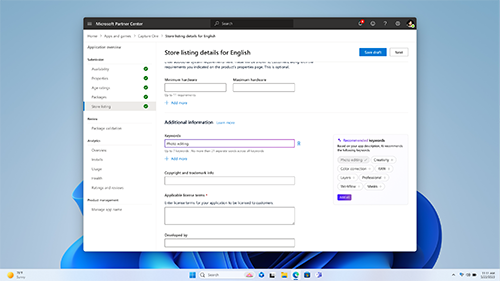News
Microsoft Announces AI-Powered Windows Copilot and Dev Home
Microsoft is increasing its AI-powered features to Windows 11, with Windows Copilot and Dev Home highlighting the handful of new integration unveilings.
The new features were announced this week at Microsoft's Build 2023 conference and the goal is to continue to get the AI tools into the hands of the community, according to Panos Panay, Microsoft's chief product officer.
"AI is the defining technology of our time and developers are at the forefront of this transformation," said Panay, in a blog post. "With the right tools we can empower developers and our shared customers to shape the future and leave their mark on the world."
Windows Copilot
 [Click on image for larger view.]
Figure 1.
[Click on image for larger view.]
Figure 1.
One of the major AI-related announcements is Windows Copilot, which brings centralized AI assistance to users through a button on the taskbar. Microsoft said Windows Copilot will remain consistent across apps, programs and windows, providing users with a personal assistant-like experience.
Windows Copilot for Windows 11 will allow users to ask questions, make inquiries, and perform complex actions, such as summarizing content or rewriting e-mails. Further, integration of Bing Chat plugins will increase engagement and customer service.
"With Bing and ChatGPT plugins in Windows Copilot, people will not only have access to augmented AI capabilities and experiences, but you as developers will also have new ways to reach and innovate for our shared customers," said Panay.
Windows Copilot will be hitting preview for Windows 11 users in June.
Dev Home
 [Click on image for larger view.]
Figure 2.
[Click on image for larger view.]
Figure 2.
Microsoft had big news during its development-focused conference with the announcement of Dev Home a productivity-focused hub designed to assist devs at every stage of their workflow. With WinGet configuration, developers can quickly set up their development machines using a single command.
Additionally, Dev Home includes Dev Drive, a dedicated storage volume optimized for developers, promising improved file system performance and enhanced security. It's built on the Resilient File System, which "offers up to 30 percent file system improvement in build times for file I/O scenarios," according to Microsoft.
Dev Home's customizable dashboard will also allow developers to monitor their workflows, access GitHub repositories and keep tabs on CPU and GPU performance. The new service is now in preview form and can be downloaded here.
Hybrid AI Loop
 [Click on image for larger view.]
Figure 3.
[Click on image for larger view.]
Figure 3.
Microsoft had more to announce for devs during Build. Microsoft's Hybrid AI Loop, which was first announced at Build 2022, is now available. Hybrid AI Loop supports AI development across various platforms and leveraging the power of Azure.
"Today, we are excited to share that our vision has become a reality using ONNX Runtime as the gateway to Windows AI and Olive, a toolchain we created to ease the burden on you when optimizing models for varied Windows and other devices," said Panay.
With support from partners including AMD, Intel, Nvidia, and Qualcomm, developers can optimize their AI models for different hardware targets, allowing for simplified AI development across cloud and edge computing through Azure.
The open source ONNX Runtime "now supports the same API for running models on the device or in the cloud, enabling hybrid inferencing scenarios where your app can use local resources when possible and switch to the cloud when needed," said Microsoft.
This should provide developers to connect with models in Azure OpenAI and AzureML services, and provide cost-saving advantages and flexibility over user experience. The new functionality is available today in the latest Azure EP preview.
Microsoft Store AI
 [Click on image for larger view.]
Figure 4.
[Click on image for larger view.]
Figure 4.
Microsoft is also bringing additional AI hooks by expanding tools to its Microsoft Store Ads, with the goal of enhancing customer reach and app discovery. One of the upcoming additions is the Microsoft Store AI Hub, a dedicated section in the Windows Microsoft Store that will showcase AI experiences developed by Microsoft and the community.
To improve app discoverability, Microsoft has also introduced AI-Generated keywords in Partner Center. This will use AI to generate and suggest search tags for apps, helping developers optimize their app's visibility in searches. AI will also compile thousands of reviews into a concise summary to improve the discovery process.
Furthermore, Microsoft Store Ads will expand their coverage to over 150 regions worldwide, starting in June. Additionally, developers will have access to a new premium spotlight placement in the Store and Bing.com search results, allowing for increased visibility and engagement.
In terms of app management, Microsoft is enhancing the backup and restore experience for apps, specifically aimed at helping developers retain their customers when they switch devices. This update is currently in preview and available to Windows Insiders.